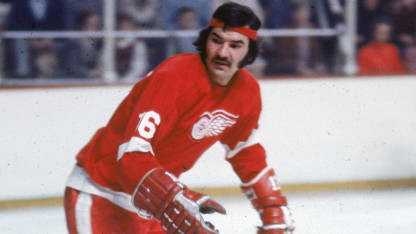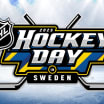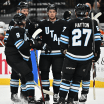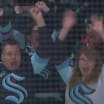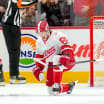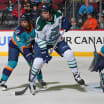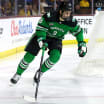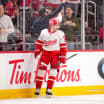ARLINGTON, Va. -- T.J. Oshie called Henry Boucha “Uncle Hank” even though he was his father's cousin.
“I don’t know,” the Washington Capitals forward said Saturday. “We have a lot of cousins.”
Regardless, Boucha, a former NHL forward and member of the United States national team, was family, someone who in addition to being a hockey and spiritual mentor played a key role in Oshie becoming an NHL player himself.
So, Boucher’s death on Monday at the age of 72 was another significant loss for Oshie after his father, Tim Oshie, who he fondly called “Coach,” died in 2021.
“It’s tough,” Oshie said. “It’s tough losing kind of those rocks, those characters, those large, large personalities from our family, but we’re a tight group and we stick together.
“Coach’ and Hank will be up there, ‘Coach’ with a beer and Hank with a glass of whiskey, and they’re watching hockey somewhere.”
It was in Boucha’s backyard in Warroad, Minnesota, where Oshie skated on an outdoor rink for the first time in 1996, when he was 10. That began Boucha’s push to get Tim to move with T.J. to Warroad to give him a better chance to excel at hockey.
Boucha knew T.J. could only go so far in the sport while growing up in Everett, Washington, which is located about 30 miles north of Seattle. Boucher starred at Warroad High School, leading it to the Minnesota state championship game in 1969, before going on to win a silver medal at the 1972 Sapporo Olympics and play six seasons in the NHL (1972-1977), where he had 102 points (53 goals, 49 assists) in 247 regular-season games with the Detroit Red Wings, Minnesota North Stars, Kansas City Scouts, and Colorado Rockies.
When Oshie’s parents divorced, he initially lived with his mother, Tina, in Stanwood, Washington, from which it sometimes took two hours to drive to practice with the Seattle Junior Hockey Association. After he stayed with Boucha while attending a summer hockey school in Warroad prior to his freshman year of high school, the decision was made for him to move with his father to Warroad for his sophomore year in 2002.
“I lived with Hank for the first three, four months when I moved to Warroad, so he was very instrumental,” Oshie said. “If I don’t move to Warroad, I don’t know if I play in the NHL, honestly. Hockey, it was very difficult where I lived in Washington to get to and from the rink and really get all my skills to the level they needed to be at to make the jump. Not only that, but just seeing someone from our family that had made that trek and made it to the NHL and came from Warroad and played high school hockey, it kind of just showed me it could be done.”
Oshie starred at Warroad High School for three seasons, helping it win the Minnesota State Class A championship in 2003 and 2005, prior to being selected by the St. Louis Blues with the No. 24 pick in the 2005 NHL Draft. Oshie then played three seasons at the University of North Dakota before turning pro with the Blues in 2008.
During his NHL career, which is entering its 16th season, Oshie helped the Capitals win the Stanley Cup for the first time in their history in 2018, and like Boucha, he represented the United States in the Olympics at the 2014 Sochi Games.
Oshie isn’t sure any of that would’ve happened without his “Uncle Hank.”
“Just a big influence on me,” Oshie said. “He was as I grew up, and especially on my dad. I think he really helped my dad deal with my successes at a young age and not let those things get to my head, and my dad kind of just let me play.”
A member of the Ojibwe tribe, Boucha also passed along to Oshie the importance of his Native American heritage.
“My brother, my sister and my dad, we all did our [Ojibwe] naming ceremony in Henry’s living room,” Oshie said. “He passed the history of that down to me.”
Oshie’s Ojibwe name, “Keeway Gaaboo,” means “Coming home.” In Boucha’s living room, Warroad became Oshie’s home, too.
Fittingly, Boucha’s funeral will be held in Warroad on Sept. 29 at Gardens Arena, where the high school’s hockey teams play and where Boucha’s No. 16 hangs along with Oshie’s. No. 19, which was retired in 2022.
“He’s a legend in these parts,” said Oshie, who declined an invitation to speak at the funeral because of his commitments at Capitals training camp. “We all knew Henry’s number was going to be up there. For mine to be up there with his, I just never thought that was ever a possibility. I don’t know why. It just seems like that’s kind of a mythical thing that doesn’t really happen to me. But it’s very cool to have our numbers up there and they’ll be up there forever.”
